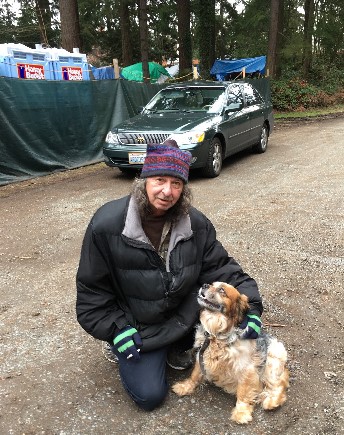By Christy Houghton
 |
| Christopher Carter |
Christopher has been an elected leader at the homeless camp, and speaks with sincerity and conviction. One of the first things I learn about him is that he’s on a personal mission.
“God Delivered Me from a Terrible Stutter”
Christopher said he’d had a bad stutter for most of life. He worked in construction as a general contractor, building houses in Oklahoma. In 2013, a traveling evangelist sent him a text, telling him to read Jeremiah 33:3. At this point, Christopher paused, and I looked at him questioningly. He just repeated, “Jeremiah 33:3.” He went home and read the whole chapter.When Christopher went to share what he'd read with his friend Theresa, she interrupted him, saying, "Christopher, you don't stutter no more." From that time on, Christopher says, “God delivered me from a terrible stutter, and has given me a beautiful voice.” It made his mother cry, when he first spoke to her without that stutter.
I didn’t learn what was in that Bible verse until I got home and looked it up. “Call to me and I will answer you and tell you great and unsearchable things you do not know.” – Jeremiah 33:3
He Needed to Go to Tent City 3
In 2015 Christopher helped a friend of his move from Oklahoma to Arlington, Washington. From there, he felt called to go to Santa Monica, California. The police picked him up on the side of the Interstate, telling him that he couldn't walk down it. You can do that in some other states, but not in Washington. In Downtown Seattle, where the police dropped him off, Christopher had planned on getting a couple day’s work for a bus ticket to Santa Monica.Someone he’d recently met at the Bread of Life Mission downtown interrupted a conversation with someone else not just once, but three separate times, to tell Christopher that he needed to go to Tent City 3. So, that’s what he did. "Years ago, I told the Father, if You need to use me or move me, give it to me in threes or sevens." Camp United We Stand was founded by Christopher and some others who were at Tent City 3.
“This is where God wants me.”
Christopher would prefer living in permanent housing, but he says, "This is where God wants me." Drawing on his construction background, he recently designed a new type of shelter made from thick Styrofoam insulation material. These shelters, called BOBs (Built On Blessings), are easy to build, relatively inexpensive, and collapsible for moving. Once tarped, they’re warmer and drier than a tent.Christopher has also been working on building a "bath house”, a foam structure with a real bath and shower using a donated tub. “The foam house is just a rest stop on my journey." Christopher has a bigger vision.
“Homelessness isn’t something that gets fixed, it needs to be healed.”
Christopher says he never felt the need of the homeless while he was living in a house. He never felt it until he came here. “Homelessness isn't something that gets fixed, it needs to be healed. Permanent housing can help with that. If every church has housing structures, people who need a place to live can come to their local church instead of going downtown where the drugs are.” Christopher has a personal mission to talk with each church in the area, asking them to reserve part of their property for people in their community who become homeless. His vision is that each church, according to its size would have portable but permanent housing.In the future, Christopher plans to keep going wherever he's led, to wherever he’s needed, to wherever his mission points.
NOTE: Since Christy’s interview with Christopher, he has left Camp United We Stand. Several of his BOBs, however, are still standing at the camp. If you are interested in seeing this innovative new structure, feel free to stop by to visit. You can find the camp’s current location at http://greaterseattlecares.org/encampments/location-hosts/.
























